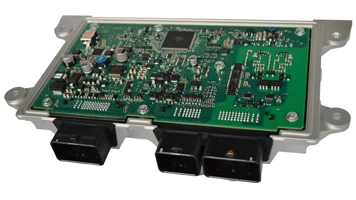Battery Management
Overview
The smart control and management of batteries in mobile and stationary use is termed battery management system (BMS).
Battery management systems consist of a battery control unit (BCU), a current sensor module (CSM) and several cell supervising electronic (CSE) units. For 48V batteries, these elements can be housed in a single control unit. For high-voltage batteries, they are separate and scaled up in a modular fashion.
The BMS also forms the interface for operating all the battery-associated peripheries and controls their functions.

Features
- Measuring single cell voltages
- Isolation monitoring of the high-voltage system
- Interlock
- DC motor control
- Cell Temperature measuring
- Different communication interfaces (e. g. CAN, LIN)
Benefits
- Platform SW available (e. g. SOC (state of charge) and SOH (state of health) calculation)
- Automotive environmental and safety requirements are considered (ISO26262 compliant)
- Information on battery condition, such as performance and SOC used to optimise vehicle operation strategy
- Adaption to different battery to topologies



